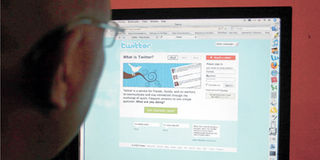Ministry unveils plan to spy on Internet users

Officials cite the recent hostility in Mombasa as a test of the government’s willingness to tolerate online dissent. The violence was in part inflamed by angry protesters on Twitter urging others to take to the streets. Photo | FILE |
What you need to know:
- It is a subtle form of surveillance, wrapped up in an effort to modernise the country’s digital sector – and to crack down on hate speech ahead of the 2013 elections.
- Officials cite the recent hostility in Mombasa as a test of the government’s willingness to tolerate online dissent. The violence was in part inflamed by angry protesters on Twitter urging others to take to the streets.
- Information permanent secretary Bitange Ndemo told the Nation that the government was now working with the “emergency response” team at Twitter to identify ‘tweeters’ who encouraged activities such as church ransacking.
For Kenya’s 6.4 million Internet users, the government could soon be part of the audience thanks to new regulations on surveillance.
“We live in the age of Internet exhibitionism,” says media specialist Leon Willems. “We are all standing naked before a window without knowing who is watching.”
It is a subtle form of surveillance, wrapped up in an effort to modernise the country’s digital sector – and to crack down on hate speech ahead of the 2013 elections.
“What we are seeing online is starting to test our values,” Kenya ICT B oard chief executive Paul Kukubo told delegates attending a conference on Internet freedom last week. “It’s about what is acceptable in a Kenyan context.”
Officials cite the recent hostility in Mombasa as a test of the government’s willingness to tolerate online dissent. The violence was in part inflamed by angry protesters on Twitter urging others to take to the streets.
Information permanent secretary Bitange Ndemo told the Nation that the government was now working with the “emergency response” team at Twitter to identify ‘tweeters’ who encouraged activities such as church ransacking.
This is part of a broader policy that will require all Internet service providers to upgrade their operating system by December.
Under the old platform, called Internet Protocol 4 (or IPv4), it was impossible to trace from where an email, tweet, or blog was posted.
Internet companies would assign an “internet protocol address” — the online equivalent of a P.O Box — to multiple people, making them effectively anonymous on the web.
The new platform, Internet Protocol 6 (IPv6), will give every Kenyan a unique IP address when they access the Internet from their computer or mobile phone.
This, in turn, makes it possible to pin point exactly where a message originates. According to Dr Ndemo, this is standard procedure worldwide.
But technology expert Christopher Parsons, who is currently researching digital surveillance at the University of Victoria in Canada, says Internet Protocol 6 has not been adopted uniformly across the globe.
And while upgrading to IPv6 is often desirable and necessary, allowing more people to access the Internet with greater ease, the technology also raises questions about privacy and freedom of expression.




